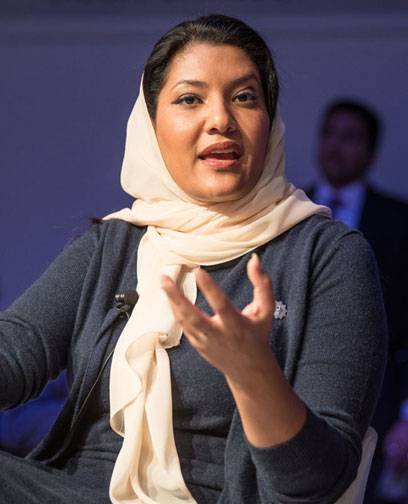LAHORE - Elsewhere in the world the appointment of a woman as an ambassador, or even her election as president or prime minister, may be a routine development, but the designation of a female as Saudi Arabia’s ambassador is something unprecedented, unbelievable.
The posting of Princess Reema Bint Bandar bin Sultan to the world’s most important capital – Washington – makes the Saudi decision even more significant. She will replace Prince Khaled bin Salman, son of the current king.
Although some women are working on important positions in the Kingdom of Saudi Arabia, and Crown Prince Mohammed bin Salman is determined to give opportunities to the female folk to play their role in various walks of life, the assignment given to Princess Reema remains the singular honour the world’s most conservative society has bestowed ever on a woman in the field of diplomacy.
This will also be the first time that a Saudi woman will be performing the job her father Bandar Bin Sultan did for more than two decades (1983 to 2005) as the kingdom’s 6th envoy to the world’s only superpower. She will also be occupying a seat giants like Turki Bin Faisal Al-Saud and Adel al-Jubeir (now State Minister for Foreign Affairs) occupied from 2005 to 2007 and 2007 to 2015, respectively. The two were country’s 7th and 8th ambassadors.
The new responsibility given to Princess Reema shows the level of confidence the Saudi leadership has reposed in her and her capabilities. Although it’s a challenging assignment, the Crown Prince is confident that she will successfully face it and set a shining example for others vying for such positions.
Under his Vision 2030, the Crown Prince plans to give 33 percent of jobs to women, a situation that will change the outlook of the Saudi society.
The timing of the new assignment is also very important. Princess Reema will take over new responsibilities at a time when agreements worth $400 billion signed between Saudi Arabia and the US during President Trump’s visit there are to be implemented. The new envoy will be required to carry out those agreements, which will certainly not be an easy task.
Prince Mohammed bin Salman was reported to have said in a TV interview that defence contracts with US and European companies have long been a source of corruption which is “unacceptable”. He further said that high military spending has not translated into better performance, a situation that adds to the challenges of the new envoy.
Before Princess Reema, some other women were also given some roles in government. For example, about a year ago, in a reshuffle, the military chief of staff, air defence, and land forces heads and senior defence and interior ministry officials were removed and Tamadur bint Youssef al-Ramah appointed as deputy labour minister, a rare high-level job for a woman in the country. This was taken as part of the Crown Prince’s efforts to modernize the society.
At the same time, the kingdom announced soldier rank positions for women in the royal military. It was reported then that opportunities will be available to women in several of the kingdom’s governorates including Riyadh, Makkah, al-Qusaim, and al Madinah.
The development was said to be part of the Crown Prince’s initiative to increasing the percentage of Saudi women in the workforce. A Saudi public prosecutor’s office said it would begin recruiting women investigators for the first time.
The kingdom has also opened 140 positions for women at airports and border crossings, a historic first that the government said drew 107,000 female applicants.
Women in Saudi Arabia can now open their own businesses without the consent of a husband or male relative. The policy change also marks a major step away from the strict guardianship system that has ruled the country for decades.
Under the leadership of the Crown Prince, women are expected to be given role in new fields.
In Pakistan, women have already been performing important roles. For example, (the late) Benazir Bhutto was twice elected as prime minister, an office her father Zulfikar Ali Bhutto also held.
Maleeha Londi, Pakistan’s ambassador to the United Nations, also served as country’s ambassador to the United States and high commissioner to the United Kingdom.
Another capable lady – Begum Abida Hussain – also served as Pakistan’s ambassador to the United States during the PML-N rule. She also remained a federal minister.
With the growing openness and induction of more women in a variety of areas, the outlook of Saudi society will change and the female folk will be able to show their capabilities.






